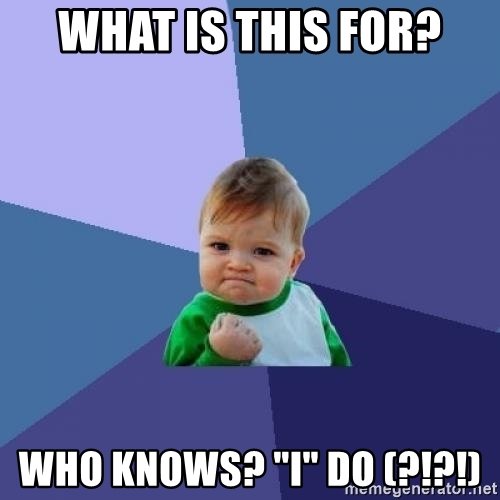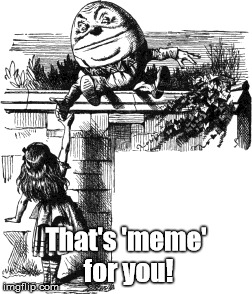The double scare quote marks should index my puzzlement. I am not wondering about “memes” but about what my puzzlement should be about. Genetics? Popular culture? Some polity (with boundaries policed by various agencies)? These questions are also indexes to my ignorance, and actually to my discovering, again, that I am ignorant of something “every one else” appears to know. “Every one” includes all those who use the word “meme” without quote marks, as something that does not require explanation or teaching. I will assume that some of those are quite sure they know what “memes” are about (for example those who coded a “meme generator”), and, of course, those who do not know but, for one reason or another do not mention their ignorance, perhaps hoping that no one will notice and make fun. As for me, I started noticing the word in the New York Times. For a while I could not quite figure what they were talking about though it seemed to be about social media, the young and cool, … and the readers of the paper to whom the editors did not explain what a “meme” might be. I was irritated, and also amused by my irritation since the whole experience confirmed for me how the media educates: by shaming readers into accepting whatever new conventions the editors deem necessary for everyone to accept as proper.
More optimistically, it may be that the NYT and other such powers educate by gently coaxing those who do not know and get them to find out for themselves. I guess this is what I am now doing after I found myself using the word as I put the final touches on the book still known as When is education (forth). I wrote; “Words have a history. They bring to mind other words in what was called the “paradigmatic” dimension of synonyms, antonyms, associated cliches, memes, poems, myths, etc.” And then I wondered whether “meme” belonged to this set that I was constituting. I was expanding the strict definition of “paradigm” in Saussurean linguistics that focuses on, to simplify, the synonyms of a word. I wanted to index any text that built further connotations for a word, somewhat like the word “belief,” related as it is to “faith,” and “creed” might be charged with the Christian Creed—something that no other religion has in quite the succinct way around which Christians have fought and continue to fight.
So I went where everyone of our generation now go: Google who provided a helpful dictionary-like definition, a link to Wikipedia, and to a “Meme Generator” (https://imgflip.com/memegenerator). The definition:

meme
noun: meme; plural noun: memes
an element of a culture or system of behavior that may be considered to be passed from one individual to another by nongenetic means, especially imitation.
a humorous image, video, piece of text, etc., that is copied (often with slight variations) and spread rapidly by Internet users.
I checked the “Meme generator” and quickly came up with “my” first meme (why are all the proposed images so ugly?). And then I tried to see whether I could make something serious and related to what I have been saying “in so many (many!) words.” [I will gladly accept instruction as to whether my proposed memes are “actually” memes…]

The Wikipedia entry was more interesting. I had absolutely no idea that the word was a neologism proposed by … Richard Dawkins of Selfish Gene fame. When I asked students in my class last Tuesday what they knew about ‘memes,” 13 out of 15 were familiar with the word but only one mentioned Dawkins. Ignorance? Or actually an instance of what Dawkins appears to have proposed (or has been taken to have proposed: there appears to be developing controversy about all this): Internet ‘memes’ would be a meme (no scare quotes), a bit of “culture’ released, and then morphing.
Now, of course, when the word ‘culture’ appears, my hackles rise and I wonder about other areas of my ignorance. Why have I always dismissed the little I knew about Dawkins? Why is there so little of the kind of anthropology about Dawkins and memes a professional anthropologist cannot completely miss? As I wrote this, I thought I’d better check. Maybe I was missing something (like I missed Latour for the first 10 years of his transatlantic fame [does his travels make him into a meme?]. I looked in vain for ‘meme’ in the index to three of Latour’s major’s work (and in Deleuze and Guattari’s opus). Where else might I search? What am I missing? Or is it anthropology that is missing something? Would Boas have investigated what people in other, parallel, disciplines were doing with matters fundamental to the understanding of humanity? Would Boas have asked his students to rise to the challenge?
I will have to investigate all this. I hope some of the students in anthropology who read this post will also investigate what may (or has already) become a major challenge to our authority to teach about humanity. I may be wrong, but I think the New York Times quote Dawkins and those inspired by his work much more often than they quote Geertz or Latour (has the paper ever quoted him?). The challenge lies in that some of what is proposed makes sense in the very Boasian sense some of us are attempting to reconstruct: bits of cultural facts do travel, diffuse, hybridize. Some are accepted and incorporated. Others are transformed. And some are more or less violently rejected. In my first encounters with American cultural anthropology, I was taught by Milton Singer to notice the travels of parcheesi into and out of India, blue jeans from Nimes to San Francisco to Hollywood and across the world. One of the most wonderful, or caricatural, of Lévi-Strauss’s paper is the one on Santa Claus Daniel Miller resurrected ([1952] 1993]. Parcheesi, blue jeans, Santa Claus are, if I read the little I know correctly, ‘memes’.
So, perhaps, anthropologists should pay attention to “memetics” and see if any of it may be useful. Have those in that field reached the point Benedict got to when she insisted that a borrowed bit would be both transformed and transformative as it got borrowed—thereby her concern with “configurations” and “culture”? Or is memetics caught in the atomism that plagues those who reduce culture to “traits”? Can there be a sociological memetics, or is the field collapsing into another cognitive psychology (as it appears to have done)?
Or can we, anthropologists, safely ignore all this?
What do you think?
References
References
Lévi-Strauss, Claude [1952] 1993 “Father Christmas executed”. In Unwrapping Christmas. Edited by D. Miller. Oxford: Clarendon Press. pp. 38-51
[print_link]